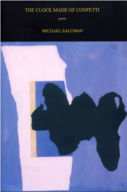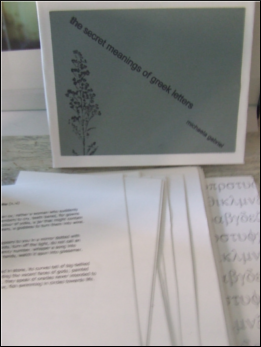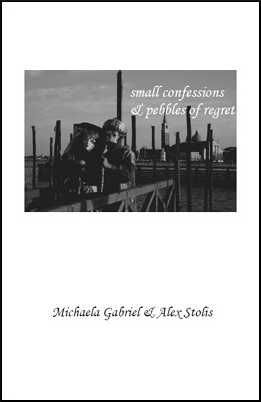Winter 2008
Table of Contents - Vol. IV, No. 4
Poetry Interview Translations Fiction Book Reviews
Christopher T. George
Michael Salcman, The Clock Made of Confetti, Orchises Press, P.O. Box 320533, Alexandria, Virginia 22320-4533, ISBN-13: 978-1-932535-11-2, 104 pp., $14.95
Michael Salcman, an accomplished poet and practicing neurosurgeon who lives in the northern Baltimore city community of Homeland, manages to juggle his diverse interests in science, poetry, modern art, and jazz. Each discipline somehow makes an appearance in his poetry, and his work is the richer for his eclectic tastes. The opening poem “Perfect” provides a “perfect” example, if you will, of how he achieves a melding of his areas of expertise and interest:
Perfect
This is what we meant for it to be—
backing out of the brain,
letting eloquent lips close over
the small spitting heart of a bruised vessel
recently clipped shut
or hiding the bed from which unruly cells
had been wrestled, removing ourselves
and our miniature extensions, closing
the dura mater with a crotchet of sutures
as if zippering a body bag
over a person’s head, replacing the lid
of sawed bone, sprinkling its dust into holes
pneumatically drilled four hours ago,
after lifting a dog-ear of muscle
and cutting a semicircle of scalp and skin
with blade and hot smoking wire,
from just in front of an auricle
to just above a brow, and now, now
no longer looking in but looking out
at the soul propped up in bed, its crown
of bandages turbaned and taped,
its eyelids bruised and closed
with seepage, its mostly successful struggle
to awake in minutes, in hours,
even the next day, applauded as perfect
by our own exhausted eyes.
Here is a visceral type of poetry, unflinching but also enriching for both the reader, and, presumably for the creator himself. The title poem of the collection, surreal and beautiful, also provides a fine example of Salcman’s craft:
The Clock Made of ConfettiIt takes a long time, all those blossoms
had to bloom and die—first
the star-shaped forsythia swept under
by red and white azalea petals
scattered like confetti,
the morning after a big party
when no one remembers what
they’re celebrating.
Then the pink crab apple had to let go
its love notes, lately interred
with a white Bradford pear.
There were more who fell
than I can remember
embraced by age and the slow pull
of gravitation: cicada shells I kicked
out of my way and the brown wren
too small for this winter, brought down
by some marauding cat.
I repeated your name each day
until snow covered the lawn
with its white leopard’s breath,
and when it melted and spring came,
I knew you were gone.
Despite a forty-year interest in writing poetry, Salcman’s journey in the world of poetry has been anything but smooth, as the interview in this issue of Loch Raven Review shows. It is to his credit that, after a ten-year hiatus in which he backed off the world of literature to concentrate on his medical and scientific writing, he came back to poetry, with the encouragement of teacher and mentor Thomas Lux.
If Salcman’s work has a downside, it might be that he sometimes has difficulty in controlling his scientific urges to provide that exact scientific term for a part of the anatomy. His use of medical terminology sometimes seems a bit obtrusive. He can come across as somewhat pedantic and professorial in his need to introduce the correct medical term, possibly not surprisingly given his successful and notable background in medicine.
An example of the poet introducing medical terms occurs in one of the finest poems in the book, about jazz legend Ella Fitzgerald. Salcman’s poem “Ella” compares favorably with Frank O’Hara’s poem Billie Holliday poem, “The Day Lady Died.” The doctor or anatomist in Salcman urges him to use the word “labia minora” to describe the act of singing: “honey and mahogany skin, pink-white / in her throat, her labia minora opening / to the night.” On the other hand, possibly the word does its job in the poem because it sounds exotic, like an orchid or some other exotic flower that only opens at night! And the poem succeeds moreover because the singer and the occasion are so well described. Here is the poem in full:
She sounds bone-thin on my old 33s—
not her voice, never that, but her body
reedy like a clarinet with breasts:
honey and mahogany skin, pink-white
in her throat, her labia minora opening
to the night, swinging with the Count
and his coronets, her plus-fours tapping
on the floor, a white bib pinned down
her dress front like a flag of surrender,
her drummer wiping his brushes against
kettle pan skins, her eyes closed behind
clear glasses, her head nodding to the beat,
flicking drops of sweat off while she swings
and twirls, a back lit amphora of a girl,
her wine-soaked voice clear as an oboe
in heat; oh lady so good, good, good to me.
It is interesting to note that many of Salcman’s poems are a single block of type and he so often avoids breaking his thoughts into stanzas. As if the urgency of the ideas have to be told in one single breath. Just a general observation: possibly roughly half of the poems in this collection are a single stanza.
Finally, the following partly fictionalized account by Salcman of the delivery of poet Allen Ginsberg by Dr. William Carlos Williams of Paterson, New Jersey, is a surprise and a gift to the reader. We are assured by Mike Salcman that the delivery of the one poet by the other was actually done by practicing physician and poet Dr. Williams—even if the added ingredient of the rural setting plus other added details somewhat gussy up the event.
Dr. Williams was making his rounds:
one dilapidated house, then another,
powdered oxygen on the aluminum siding,
brown shingles on the roofs.
In between visits, he’d sit in his car
a notebook on his lap and arrange words—
instruments on a surgical tray—
uterine sounds blunt as tire-irons,
scalpels sharper than paper.
Often a cry from within the house
would bring him running past its yard,
past a tomato plant or wheelbarrow or red hen,
things he took in as he sprang
up the porch steps, hoping the family
was already in the parlor, had put the kettle on,
had found clean towels and disinfectant
to swab the wound or welcome the crowning head.
He put down his old-fashioned doctor’s bag,
a satchel peaked like a dormer at both ends,
his initials stamped in gold, long ago faded,
and took off his wool overcoat. Tonight,
he noted the burdened book shelves,
responsible chair, the goose-necked reading lamp,
the desk loaded with papers, writing tools
and a folding pince-nez: the father
was a professor or writer of some degree,
who could afford both coal and electric.
He suspected they were Jewish, the mother
of German ancestry, the father Sephardic—
but had no reason to know. In truth
he had only a cursory familiarity with their tribe
and knew no Hebrew. But the mother’s cry?
Soon, it was going to be soon. He timed her pain
until a dark spot between her labia grew
and it was time to prep and drape her;
then he encouraged the head with a gloved hand
turned the shoulders and delivered the rest.
Dr. Williams told the father it looked like a writer,
this noisy boy, vigorous and exploring.
They would name him Allen.
Nice work here by the physician-poet in bringing this event to light. Salcman’s line that envisions the doctor walking “past a tomato plant or wheelbarrow or red hen,” nicely evokes William Carlos Williams’s own most famous poem, his 1923 composition, the simple but hugely effective “The Red Wheelbarrow”:
so much dependsupon
a red wheel
barrow
glazed with rain
water
beside the white
chickens.
Possibly only a doctor and poet such as Dr. Michael Salcman could “deliver” such a delight.
Michaela A. Gabriel,
the secret meanings of greek letters, dancing girl press, 2007,
$9.00 (includes S&H).
Michaela A. Gabriel and Alex Stolis,
small confessions & pebbles of regret, Rubicon Press, 2008,
$7.00.
Austrian
poet Michaela A. Gabriel has two recent published projects of note. One is, if you will, a “box set” or if you will
a “chapbox” of notecard poems which are contemplations, as the title suggests, of the meaning of different Greek letters.
The other is a collaboration with American poet Alex Stolis entitled small confessions & pebbles of regret,
comprising a series of letters between the two.
The meditations in the secret meanings of greek letters, as you might suspect, have an almost zen-like quality to them. Here’s a sample, the first of two stanzas for “eta”:
where each petal unfurls a tale: has done, could be, always
will. the moon tiptoes across worn cobblestones, adds a line
or two, hand-picked words to place in a young girl’s palm
The poem for “xi” is one of the longer pieces on the cards, all which measure a shade under six inches by five inches:
xiDream is one-sixtieth of prophecy.
— The Talmud
The woman calls herself Shirley, a name so mundane
there must be something fishy; you refuse to fall for
its curly sound, suspect criminal intent in the snaking S.
There she is, sniffing out incestuous trysts like manna.
She reports to stricken relations in villanelles, sums up
gory details in honey-coated haiku. Swallow; she will
keep feeding you bits of what will turn into your truth.
A sign on weather-beaten wood announces fire—
but this will be no gentle flames persuading scented
wax into tame shapes. You think you are prepared.
You think those northern clouds hold enough rain.
But look, the devil’s draining them, and you won’t
sell your soul to save his hell from drowning. Go,
croaks a raven, gather clay, bake yourself an armour.
Sleep comes in the shape of a fish swimming through
your open mouth. Colours change, a frantic wind cuts
grooves into the ashen sky, nimbus clouds towel down
a rainbow. Your eyes shut, your lips give up: you cannot
suck all greyness from this world. Death has his hands
deep in a sack of soot, draws rings around each life.
In your belly, the fish discards its beginning, its end.
The Greek letters project has a homeschool-like feel, with the label on top of the box of poems with the inked impression of a flower. The cards though are professionally printed and the whole has an attractive and eclectic appeal. Nicely done, Michi!
The collaboration with Mr. Stolis of course is something else again, a sometimes edgy exchange of letters. This reviewer was under the misconception though that Ms. Gabriel and Mr. Stolis were actually former lovers and that they got together to write the book as a collaboration as it were, perhaps, to work some things out. That would have added extra brio to the collaboration. But we are assured by the parties concerned that they have never met.
Here are two examples of poems from the book, first one by Mr. Stolis and the second by Ms. Gabriel:
I want to forget you ever loved me, forget that time can stop the bleeding
and it’s possible to walk again after my legs have been broken.
Let’s go back to the city where we met—I’ll wait in the restaurant
where you watched me make a fool of myself with that dark Rapunzel.
If it were possible to fly and watch stars waver in place, teeter on the brink
then topple down a mountain—I wouldn’t want to change my name again
and again. I should know how this works—there are only so many miracles
to go around and mine have been pawed over by too many greedy hands
and now I find I have nothing. I think about waking up godless and hung-over,
waiting for ocean waves to collapse on the beach, hoping for someone
to fish me out of the sea. We are supposed to believe that death is bold—
a loud noise from behind, the roar of a train, the sharp crack of a gun
and beginnings are never sudden movements, they’re soft and unobtrusive.
Last chances are smoky bar rooms overflowing with harsh consequences,
consequences that will cut you off at the knees and leave you blind.
I rearrange the faces of lost friends and lovers
until all that’s left is a punch-drunk Sisyphus, stranded on a hill—
disenchanted and ordinary.
Ever yours,
L_______
* * * *
Dear L_______,
Unlearning to love you is like sucking back sand through the narrow
waist of an hourglass. I already have a desert in my throat, a desert
crossed and recrossed by words that have begun to shape my mouth:
never; again; your name. Sometimes a question slips from underneath
my tongue: Did we let it die too quickly? But we both know that death
is not bold. Death grabs what he can get, strangles his victims from
the shadows between streetlights. He chooses wisely—never anything
that will put up a fight. The end was like the beginning—a moment
we missed, the way you’d miss a landmark from the window of a train
that moves too fast, eyes aimed too high, too low until you realise
you’ve already gone past, and you slam down the window, crane your
neck and hear the air rush in to push all words of loss and longing
up your windpipe. There is no going back, not to a morning of soft
sunshine on unfamiliar skinscapes, not to the city where we met;
it no longer exists. Its roads have moulted, the pines shed needles
like flakes of dry skin. Everything we touched, has been touched
a thousand times since. Rapunzel’s hair has fallen, again and again,
like a rope, like a ladder; the streets to her tower echo with laments.
J_______
As in her Greek letters project, Ms Gabriel’s work is rich, and Mr. Stolis’s is equally colorful and profound. A nice and worthwhile collaboration. Congratulations to both artists. We do see from the Rubicon Press site that the book is presently out of print. Let us hope a fresh printing will make it available.
Ms. Gabriel, born in 1971 in Spittal/Drau, Austria, attributes her activity in poetry to the growth of internet poetry in the 1990’s. In regard to these two projects, she has said in an interview on the literary blog site verylikeawhale: “I started working on the secret meanings of greek letters with a chapbook collection in mind, it was always intended as a series, with one poem per Greek letter. Same with the collaboration I wrote with Alex—we had this concept of a series of letters, and we worked on it with a chapbook in mind. And the full-length manuscript I am working on, elemental, is another themed book—one poem for each element in the periodic table.”1
Based on the good work in these two collections, we will certainly look forward to Michi Gabriel’s new book.
![]()
1 “Ten Questions (2): Michaela Gabriel," verylikeawhale, April 24, 2008
© Christopher T. George



